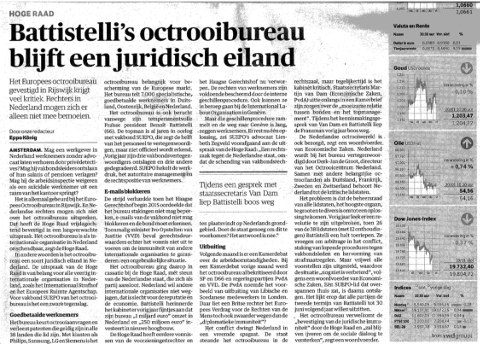

THE VERY FIRST article we found about the Dutch court's decision on the EPO we translated and published on the 20th of January. A very similar article was published in print (see above) and SUEPO has a translation of it. The author, Eppo König, is already familiar with the scandals, having written about them before, e.g. in [1, 2]. Here is SUEPO's translation:
SUPREME COURT
Battistelli’s patent office remains a legal island
The European Patent Office, based in Rijswijk, has been widely criticised. But courts in the Netherlands cannot intervene.
By our editor Eppo König
AMSTERDAM. Can an employer in the Netherlands have employees interrogated by a private detective without a solicitor? Can they dismiss trade-union leaders or reduce their salary or pension? Can they refuse access to the Labour Inspectorate if a suicidal employee jumps from a window of the office?
All this has happened at the European Patent Office in Rijswijk. And Dutch courts cannot pass rulings relating to the patent office. The Supreme Court confirmed this on Friday morning, in a long-awaited ruling. As an international organisation in the Netherlands, the patent office is immune, according to the Supreme Court.
In other words, the patent office is a kind of legal island in the Netherlands. The Supreme Court ruling is significant for all forty international organisations in the Netherlands, including the International Criminal Court and the European Space Agency. For the patent office trade union SUEPO, this is a major setback.
Well paid employees The office approves patent applications and grants patents that apply in all 38 countries who are members. With customers including Philips, Samsung, LG and Siemens, the patent office is important in protecting the European market. The office has 7000 specialised, well paid employees in Germany, Austria, Belgium and the Netherlands.
The patent office is also infamous, thanks to the temperamental French president, Benoît Battistelli (66). The president has now been at war for years with the SUEPO trade union, which says it represents half the staff but is not officially recognised. Last year, three trade- union representatives were dismissed and three others were demoted. SUEPO has denounced the work pressure, the authoritarian management and the legal position of the employees.
Emails blocked The battle intensified when the Court of Justice in The Hague ruled in early 2015 that the office could not limit strikes, block emails from the trade union and must recognise the union. Then Minister of Justice, Ivo Opstelten (VVD), ordered that the judgement should not be implemented, however, in order to guarantee the immunity of other international organisations: a very unusual situation.
The patent office appealed to the Supreme Court on this matter, with the support of the Dutch state, which acted as a party in the case. The Netherlands does not want to drive away other international organisations, as that would be bad for its reputation as well as its economy. Battistelli smartly reminded the cabinet last year that his office creates ‘1 billion euro’ in revenue in the Netherlands and is investing ‘250 million euro’ in new high-rise development.
The Supreme Court has now rejected previous judgements by the preliminary injunction court and Court of Justice in The Hague. The rights of employees are already sufficiently protected by the internal disputes procedure. They can also appeal to the International Labour Organisation (ILO) in Geneva.
But this disputes procedure is shaky and the road to Geneva is a long one, say employees. Only one solution remains, said SUEPO’s lawyer Liesbeth Zegveld, before the Supreme Court’s ruling. “Proceedings against the Dutch state, as the violation of trade-union rights is taking place on Dutch soil. Is the state doing enough to prevent this? The answer is no.”
During a conversation with State Secretary Van Dam, Battistelli left in anger
Exploitation Next month, there will be a parliamentary debate on the working conditions. During a parliamentary debate last month, the patent office was already criticised by the SP and D66 as well as the ruling PvdA and VVD. The PvdA gave the example of the exploitation of Libyan and Sudanese employees in London. Didn’t a British court rule in that case that the European Convention on Human Rights weighed more heavily than ‘diplomatic immunity’? The conflict has forced the Netherlands to confront a strange dilemma. The state supported the patent office in the courtroom but, at the same time, the cabinet is critical. State Secretary Martijn van Dam (Economic Affairs, PvdA) recently expressed his concerns about the ‘difficult relationship between unions and the top management’ in a letter to parliament. During the introductory meeting between Van Dam and Battistelli last year, the Frenchman left in anger.
The Dutch patent world is also concerned, says an Economic Affairs spokesperson. The Netherlands is represented at the office by Derk-Jan de Groot, director of the Netherlands Patent Office. Together with other important patent countries, such as Germany, France, Sweden and Switzerland, the Netherlands is among the critical member states. The problem is that the Administrative Council of all member states, the highest body, is too large and diverse to come up with a solution. Last year a revolution seemed to have broken out, when 26 of the 38 member states (with 12 abstentions) called a halt to Battistelli’s actions. They demanded arbitration in the conflict, an end to ongoing proceedings against trade-union members and reformation of the punitive measures. But almost all proposals were delayed, so that the situation ‘has not yet improved’, according to an Economic Affairs spokesperson. One member of SUEPO, who was at home with stress, was then dismissed. It seems as if all parties want to wait out Battistelli’s second term, until 30 June next year. The patent office welcomes the ‘confirmation of the legal immunity’ by the Supreme Court and ‘will continue to strive to strengthen the social dialogue’, says a spokesperson.